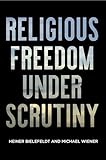Religious Freedom Under Scrutiny / Heiner Bielefeldt, Michael Wiener.
Material type: TextSeries: Pennsylvania Studies in Human RightsPublisher: Philadelphia : University of Pennsylvania Press, [2019]Copyright date: ©2020Description: 1 online resource (280 p.) : 1 illusContent type:
TextSeries: Pennsylvania Studies in Human RightsPublisher: Philadelphia : University of Pennsylvania Press, [2019]Copyright date: ©2020Description: 1 online resource (280 p.) : 1 illusContent type: - 9780812251807
- 9780812296686
- 323.44/2 23
- K3258 .B54 2020
- online - DeGruyter
- Issued also in print.
| Item type | Current library | Call number | URL | Status | Notes | Barcode | |
|---|---|---|---|---|---|---|---|
 eBook
eBook
|
Biblioteca "Angelicum" Pont. Univ. S.Tommaso d'Aquino Nuvola online | online - DeGruyter (Browse shelf(Opens below)) | Online access | Not for loan (Accesso limitato) | Accesso per gli utenti autorizzati / Access for authorized users | (dgr)9780812296686 |
Browsing Biblioteca "Angelicum" Pont. Univ. S.Tommaso d'Aquino shelves, Shelving location: Nuvola online Close shelf browser (Hides shelf browser)

|

|

|

|

|

|

|
||
| online - DeGruyter Human Rights and Global Governance : Power Politics Meets International Justice / | online - DeGruyter Political Advocacy and Its Interested Citizens : Neoliberalism, Postpluralism, and LGBT Organizations / | online - DeGruyter Divided Unions : The Wagner Act, Federalism, and Organized Labor / | online - DeGruyter Religious Freedom Under Scrutiny / | online - DeGruyter Capitalism's Hidden Worlds / | online - DeGruyter Dead Voice : Law, Philosophy, and Fiction in the Iberian Middle Ages / | online - DeGruyter Beyond the Politics of the Closet : Gay Rights and the American State Since the 1970s / |
Frontmatter -- CONTENTS -- Introduction -- Chapter 1. Universalism Tainted with Particularisms -- Chapter 2. Ambiguities of Freedom -- Chapter 3. Equality in Diversity -- Chapter 4. Awkward Bedfellows? Religious Freedom and Other Human Rights -- Chapter 5. Shades and Modes of Secularisms -- Chapter 6. Violations of Freedom of Religion or Belief -- Chapter 7. Comparing International and Regional Case Law -- Chapter 8. Preventing Violence Committed in the Name of Religion -- Chapter 9. Custodian Against the Sacralization of Human Rights -- Notes -- Bibliography -- Acknowledgments
restricted access online access with authorization star
http://purl.org/coar/access_right/c_16ec
Freedom of religion or belief is deeply entrenched in international human rights conventions and constitutional traditions around the world. Article 18 of the Universal Declaration of Human Rights enshrines the right to freedom of thought, conscience, and religion as does the International Covenant on Civil and Political Rights, which the United Nations General Assembly adopted in 1966. A rich jurisprudence on freedom of religion or belief is based on the European Convention on Human Rights, drafted in 1950 by the Council of Europe. Similar regional guarantees exist in the framework of the Organization of American States as well as within the African Union. Freedom of religion or belief has found recognition in numerous national constitutions, and some governments have shown a particularly strong commitment to the international promotion of this right.As Heiner Bielefeldt and Michael Wiener observe, however, freedom of religion or belief remains a source of political conflict, legal controversy, and intellectual debate. In Religious Freedom Under Scrutiny, Bielefeldt and Wiener explore various critiques leveled at this right. For example, does freedom of religion contribute to the spread of Western neoliberal values to the detriment of religious and cultural diversity? Can religious freedom serve as the entry point for antifeminist agendas within the human rights framework? Drawing on their considerable experience in the field, Bielefeldt and Wiener provide a typological overview and analysis of violations around the world that illustrate the underlying principles as well as the relationship between freedom of religion or belief and other human rights.Religious Freedom Under Scrutiny argues that without freedom of religion or belief, human rights cannot fully address our complex needs, yearnings, and vulnerabilities as human beings. Furthermore, ignoring or marginalizing freedom of religion or belief would weaken the plausibility, attractiveness, and legitimacy of the entire system of human rights.
Issued also in print.
Mode of access: Internet via World Wide Web.
In English.
Description based on online resource; title from PDF title page (publisher's Web site, viewed 21. Jun 2021)


